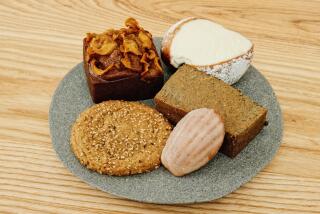Where East meets East: a hot fusion at your table
- Share via
Jin Sang is a serene room, all in minimalist shades of black and gray. Never mind that a caldron will soon boil vigorously in the center of your table.
The caldron is for shabu-shabu: meat or seafood dropped with vegetables into boiling liquid, then drained and dipped in sauces. The sumptuous broth remaining in the caldron is the climax of the meal.
Shabu-shabu is the specialty at Jin Sang, part of a Korean chain with several branches in Seoul, one in Japan and one in La Jolla. Though much of the food is Japanese -- and some is Western-influenced -- the restaurant has a strong Korean accent. (Koreans are so fond of Japanese cuisine that sushi bars have found their way into barbecue restaurants.)
But instead of grilled meats or raw fish, shabu-shabu is the hit here. And to confuse the issue a bit more, the hot pot -- although popular in Japan -- originated with the Mongol warrior Genghis Khan in the 13th century (or so the menu says).
A waitress starts the pot boiling over a burner set into the table. She adds ingredients and fishes them out when done. You can do this yourself, but it’s nice to be pampered.
For beef shabu-shabu you can specify Choice, Prime or Kobe. The famous Japanese Kobe beef is three times as expensive as choice. (Is it worth it? To my mind, only if you can distinguish between grades of wrinkly boiled meat.) The seafood shabu-shabu choices include squid, salmon, shrimp and scallops.
The vegetables are ssukkat (chrysanthemum greens), bok choy, nappa cabbage, green onions and mushrooms. Tofu and a dumpling or two may go into the pot. When everything has been cooked, the waitress mixes kimchi, hot chile and garlic with the liquid to create a broth for wonderfully chewy noodles and rice cakes.
Even sukiyaki (a Japanese beef and vegetable hot pot) has a Korean twist. Cooked at the table, it ends Korean-style with a thick porridge of rice mixed with the broth left in the pot and gently enhanced with egg, seaweed, green onion, sesame and garlic. Sangchu ssam shabu, sliced beef to be boiled and wrapped in lettuce, is served along with a hot sauce and rice and shredded egg pancake.
Side dishes hold pickles and a tiny wad of kimchi, which Koreans demand even with Japanese food. All kimchi is spicy, but Jin Sang’s stands out for bold flavor that brings horseradish to mind. Jin Sang has an intriguing menu of appetizers. They include a predictable smoked salmon platter, but the Sicilian special salmon salad is a shock: lettuce tossed with smoked salmon, stuffed olives, capers and onions in Italian dressing, surrounded by guess what? Doritos nacho cheese chips!
The Pacific fajita is fusion-style Korean kujolpan: crumbled beef, shredded kelp, onion and carrots, eaten with small pancakes along with a sauce that resembles salad dressing. Jin Sang’s “carpaccio (tataki)” is paper-thin slices of Prime beef, lightly browned at the edges but very rare in the middle, topped with a slice of fried garlic and a speck of horseradish. Kimchi ball is shrimp, tuna, vegetables and kimchi wrapped in a pickled nappa cabbage leaf.
With this attention to appetizers, it’s no surprise the restaurant has a weekday-afternoon happy hour. The bar list tops out at $250 for a bottle of Johnny Walker Blue Label, but my drink of choice would be the lemon sour made with soju, a Korean alcoholic beverage distilled from sweet potatoes; tonic; and lemon juice in an iced mug. It’s as refreshing and cool as this stylish restaurant.
*
Jin Sang
Location: 2979 W. Olympic Blvd., Los Angeles, (213) 387-1600.
Price: Appetizers, $6.80 to $9.80; entrees, $12.80 to $45.80 (Kobe beef).
Best dishes: Shabu-shabu, sangchu ssam shabu, sukiyaki, Pacific fajita, beef carpaccio, kimchi ball.
Facts: Open from 11:30 a.m. to 10 p.m. Monday through Saturday; 5 to 10 p.m. Sunday. Full bar. Parking lot. Major credit cards.
More to Read
Eat your way across L.A.
Get our weekly Tasting Notes newsletter for reviews, news and more.
You may occasionally receive promotional content from the Los Angeles Times.










